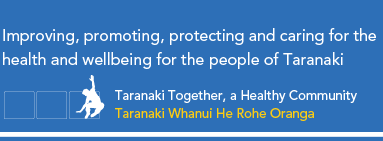Measles case confirmed in Taranaki after returning from overseas
12 November 2014
The Public Health Unit of Taranaki District Health Board has confirmed a case of measles in Taranaki.
A child contracted measles while overseas and returned to New Zealand, via Auckland on November 2, 2014.
Dr Greg Simmons, Acting Medical Officer of Health said “The child would have been infectious at the time of travel and once they returned to Taranaki. The Public Health Unit is working through a list of people who have come into contact with the child and who maybe at risk of developing English measles. They are providing these people with information about the disease and what to do if symptoms develop,” he added.
“Measles is spread by tiny droplets in the air and is one of the few diseases that can spread very easily to those nearby. Anyone displaying symptoms of measles, which include fever, cough, runny nose and sore red eyes, should immediately telephone their Doctor’s surgery or Healthline on 0800 611 116 for advice,” said Dr Simmons.
“After a few days a red blotchy rash develops and lasts up to one week. It usually starts on the face and spreads to the rest of the body. Children and adults with measles are often very sick.”
“If families suspect someone has measles it is important to call the Doctor’s surgery first because measles is highly infectious and people with measles can infect others in the GP’s waiting room,” he added.
“Measles can be a very serious illness, with one in three sufferers experiencing complications such as ear infections, pneumonia, bronchitis or diarrhoea,” said Dr Simmons.
“Immunisation is the best protection from this potentially serious disease. Immunisation protects not only the individual, but also blocks the spread of this disease within our communities,” he said.
Unimmunised people who have had contact with a person with measles, will normally be advised to stay at home and away from all public places, school or work for 14 days after their contact.
Anyone born before 1969 or who has received two doses of MMR vaccine can reasonably assume they are already immune.
People who are regarded as not immune to measles are:
- People younger than 45 years old (born after 01 January 1969) who have not had two doses of the measles-mumps-rubella (MMR) vaccine or have not had a laboratory confirmed positive measles result
- Children over four years old who have not received their second dose of MMR
- Infants under the age of 15 months who have not received their first routine dose of MMR vaccine. They are susceptible and rely on everyone else to be immune so that measles does not spread to them.
ENDS
For more information please call –
Cressida Gates, Media Advisor, Ph 027 703 6177
Questions & Answers
What is measles?
- Measles is a highly infectious viral disease that can be serious.
- It is spread from person to person through the air by breathing, sneezing or coughing. Just being in the same room as someone with measles can lead to infection if you are not immune.
Who is at risk of measles infection?
People are at risk of getting measles if they are not immune to it. People who are regarded as not immune to measles are:
- People younger than 45 years old (born after 01 January 1969) who have not had two doses of the measles-mumps-rubella (MMR) vaccine
- Infants under the age of 15 months who have not received their first routine dose of MMR vaccine. They are susceptible and rely on everyone else to be immune so that measles does not spread to them.
- Children over four years old who have not received their second dose of MMR.
What should you do?
- Ensure you are up to date with your immunisations.
- If you are not immune it is important to be aware of the symptoms of measles. The early symptoms of measles are fever, runny nose, sore red eyes and cough.
- After 3-5 days a red, blotchy rash appears on the face and head and then spreads down the body.
If you develop symptoms of measles:
- Stay at home and away from public places (such as sports events, gatherings, parties, school, work, child care, shopping centres, public transport and so on).
- See your doctor as soon as possible so a diagnosis can be confirmed. However, phone the surgery ahead to alert them of your symptoms and to allow them to make arrangements to assess you safely and without infecting other people.
- If you need advice phone Healthline on 0800 611 116.
Last updated: Wednesday, November 12, 2014


